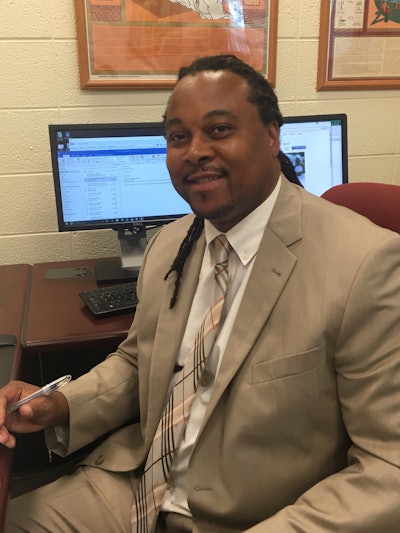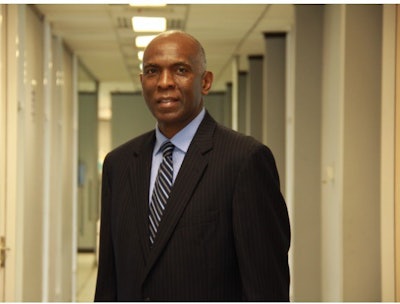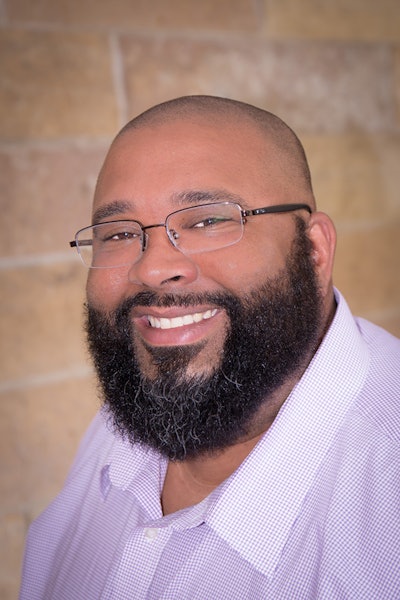In October, a skilled group of 14 community college administrators gathered in Baltimore to begin their journey as Lakin Fellows with the Thomas Lakin Institute for Mentored Leadership.
Sponsored by the Presidents’ Round Table — an entity of the National Council on Black American Affairs and an affiliate of the American Association of Community Colleges — the Lakin Institute for Mentored Leadership was founded to prepare Black senior-level community college executives for positions as chief executive officers. This was the 24th annual Lakin Institute gathering.
Named in honor of Dr. Thomas Lakin, who was a longtime president and community college chancellor and visionary, the institute has had tremendous success in producing the highest number of African-Americans who have gone on to assume CEO positions over any other leadership institute in the United States.
Of the 333 participants who have gone through the weeklong program, two have become chancellors, 86 have become community college presidents and about 13 have become provosts.
At this year’s gathering, veteran community college leaders like Dr. Belle S. Wheelan, president of the Southern Association of Colleges and Schools Commission on Colleges and the former president of Northern Virginia Community College, and Dr. Walter Bumphus, the president and CEO of the American Association of Community Colleges, mentored the participants. The Fellows participated in mock interviews, received assistance on how to prepare their curriculum vitae and cover letter, and learned about the various aspects of running an institution. About one-third of these Fellows will go on to become college presidents within the first three years of completing the institute.
“With the complex leadership challenges we are experiencing now, and in the future, this group will be able to demonstrate that community colleges are in good hands,” says Dr. Kirk A. Nooks, dean of the Lakin Institute and president of Metropolitan Community College-Longview located in Lee’s Summit, Missouri. “The American Council on Education’s 2017 American College President Study indicates that African-American leaders account for about 8 percent of the college presidency. Based on a historical rate of change, racial parity within the college presidency will occur in 2050. This Institute will endeavor to accelerate this timeframe.”
While diversifying the leadership of community colleges remains a daunting task, the Lakin Institute is providing future college presidents with a briefcase of strategies and knowledge that will ensure their success. And that is why we are putting a spotlight on this year’s fellows. Anyone who is deeply concerned about diversity and the future of the community college should support this laudable mission.
Throughout the week, we will showcase the Lakin Institute Fellows, highlighting their success and accomplishments.
Kwesi Amoa
Dean of the School of Mathematics, Science, and Engineering
Westchester Community College
 Kwesi Amoa
Kwesi Amoa
The trajectory from faculty to administration was a natural one for Dr. Kwesi Amoa, dean of the School of Mathematics, Science, and Engineering at Westchester Community College. His experiences in various levels of higher education allowed him to understand student success holistically. That said, Amoa arrived at administration through the practical experience of working with students and through the encouragement of his colleagues.
After completing a Ph.D. in chemistry from Howard University in 1996, Amoa started his career as a chemistry teacher at Springfield Gardens High School, where he successfully connected with students at a deeper level.
“It was a rewarding experience,” Amoa says. “I actually probably would have stayed at that level of teaching because the kids looked like me, I looked like them, and that made a big difference in the learning for them.” He adds that he was able to visit the homes of struggling students, leveraging his ties with the community to ensure their success in the classroom.
In 2001, he earned a tenure-track position in the Department of Chemistry at Medgar Evers College in Brooklyn. As an assistant professor, Amoa had ideas for revamping approaches to student success in the chemistry classroom. But as an early-career faculty member, Amoa struggled to get his ideas in motion.
“Only when I got to that position of being a department chair was I able to move long held ideas,” he recalls. One of the initiatives he pushed was online chemistry courses. Amoa says his data showed comparable student success rates for students of in-person and online classes, which led him to advocate for this more practical method for teaching chemistry.
Since becoming dean at Westchester Community College in 2016, Amoa has been continuing his teaching as well as focusing again on practical education, but this time in mathematics. He says he hopes to design math classes around particular careers and the skillsets these require.
In his own personal career, he hopes to pursue more administrative roles in the hope of providing a scientific and data-oriented approach to student success at all sorts of institutions of higher education.
“As far as I’m concerned, whether you’re at a community college or a four-year comprehensive college, it doesn’t make much of a difference,” he says. “Whether you hit a home run in minor league versus the big leagues, a home run’s a home run.”
Keith Berry
Dean of Academic Affairs
Ybor City Campus, Hillsborough Community College
For Dr. Keith Berry, a tenured history professor and dean of academic affairs of the Ybor City Campus of Hillsborough Community College, the path to a higher education career began with a simple question.
 Keith Berry
Keith BerryThe question came from a history professor during his undergraduate years at Florida A&M University, where Berry started out as a broadcast journalism major.
“A history professor named Dr. Ted Hemmingway asked me what I knew?” Berry recounts. “He bluntly stated that I should study history so ‘I would know what the hell I was talking about.’”
Berry ultimately switched his major to history and the rest is, well, history.
“I have always liked stories, and good history involves stories,” Berry says.
Berry says his interest in history actually stems from looking at his parents’ yearbooks from their days at Fisk University.
“The smartly dressed beautiful young men and women were fascinating to me,” Berry said. “I continued on with my studies because everything I learned created more questions for me to explore.
“I did all three of my degrees in history,” says Berry, who earned a bachelor’s degree in history from FAMU and a master’s degree and later a Ph.D. in American history from Florida State University.
“Teaching became a natural path for me because I learned that I could use history to help me understand the present,” Berry says.
Berry’s interests and experience at Hillsborough Community College transcend the classroom.
For instance, he was instrumental in creating the infrastructure for a pilot mentoring program meant to enhance retention, graduation and four-year college transfer rates for African-American and Hispanic male students.
“The idea for a minority mentoring program was conceived by Dr. Joan Holmes, equity officer, and special assistant to the president,” Berry says. “Dr. Holmes allowed me the opportunity to create the infrastructure the way I saw fit.”
Berry recruited 23 faculty mentors and established a program complete with tutors, college tours, seminars and panel discussions.
“We enjoyed a 72 percent success rate regarding retention and four-year college transfer during my tenure,” Berry says.
Berry has his sights set on a college presidency at some point in the future.
“I have always sought to expand my platform in order to be of service to others,” Berry says. “To that end, I would like to become a college president before I retire, and the Lakin Institute — without question — has been instrumental in my journey toward that goal.”
Lawrence D. Brandyburg
Special Assistant to the President
Lone Star College-University Park
For Dr. Lawrence D. Brandyburg, the path to higher education began on a track.
“Initially I had no plans to go to college but was recruited by the track coach,” Brandyburg recalls of being recruited to run for Blinn College, a community college in Brenham, Texas. “My plan was to go into the military as an enlisted soldier. I had already started planning for that.
“It just so happened I was a decent little runner.” Brandyburg recalls the days when he ran the 110-meter high hurdle race in 14.1 seconds.
 Lawrence Brandyburg
Lawrence BrandyburgBrandyburg was ultimately awarded a track scholarship to attend Blinn. And although his track and field days are a thing of the past, you might say Brandyburg has been clearing high hurdles and running ever since.
In addition to a military career that includes the Bronze Star for meritorious service during Operation Desert Storm and the Kuwait Liberation Medal, Brandyburg has led a distinguished career in higher education that spans the globe.
He currently serves as special assistant to the president at Lone Star College-University Park. Brandyburg counts his experience as founding vice president at the school as the top highlight of his career.
“I opened a campus with about 4,000 students in spring 2012, and by the time I left the campus in 2015, we had almost 10,000 students,” Brandyburg says.
A recent assignment took him to Jakarta, Indonesia, where he served as CEO and vice rector of academic affairs and student success for Lone Star College-Jakarta.
Brandyburg says the student population at the Jakarta campus grew from 89 students in 2015 to about 600 by the time he left this past July.
“One thing we did was developed — for the first time in Indonesia’s history — what is called early college,” Brandyburg says, explaining how the college’s enrollment grew so rapidly during his time as CEO at the college.
Brandyburg also credits the growth to an articulation agreement he wrote between the Jakarta-based campus and Louisiana State University, which also has a school on the same campus, so that engineering students with a 2.5 GPA or better can go directly to the LSU engineering program. A similar articulation agreement for business students involved Morgan State University.
Previously, during his time as instructional dean at Lone Star College–Montgomery, Brandyburg oversaw the development of remedial math “modules” that enable students to get through remedial math courses quicker. He hopes to parlay all of his higher education experience into a college presidency in the future.
Narren Brown
Associate Vice President of Research & Institutional Effectiveness
South Central College
Dr. Narren Brown finds his Zen while working with data. After hours of administrative meetings, he finds peace in front of his computer, losing track of time as he searches for the “leakages” in the student success pipeline within the figures.
“When I’m working on a dataset — this sounds corny — but I can actually see in my head how the data’s moving,” he says. “If I’m working on a dataset at five o’clock at night, it might be eight o’clock before I look up.”
 Narren Brown
Narren BrownHe honed his skills while serving in various positions at Grinnell College, where he used data to design protocols to improve the institution’s capability to promote student success.
“What Grinnell did for me was provide an invaluable training,” Brown explains. “I got to apply what is my trade, data analytics, to different departments to see how it worked.”
When he decided to accept a position at South Central College in 2016, he remembered the advice from a mentor. “There’s something he said that still rings true,” Brown says. “If you don’t have the resources to be successful, don’t take the position.”
South Central provided him the staffing and budgetary resources that would help the institution reach the goal of automating processes and optimizing student and faculty experiences. Brown describes his team as a “fabulous team of dedicated individuals.”
That said, his current role as associate vice president of research & institutional effectiveness at South Central College in Minnesota requires him to be flexible.
“Every day is different at South Central,” he says. Brown and his team work with different sets of data to produce reports that facilitate rapid and informed decision-making by the college’s administrators.
Brown’s office collects data by communicating with faculty, enabling them to raise flags for at-risk students. The instructors’ participation allows counselors to follow up with these individuals. Another method of data collection is asking questions about clothing or food needs at student affairs events. Students respond to these questions using remote control clickers. Starting the next fiscal year, Brown says, the college will open a closet and food pantry for its students.
Looking ahead, Brown hopes to grow in his commitment to student success, eventually as a college president.
“If I’m not helping students be more successful, then I need to quit what I’m doing,” he says. “That’s my motivating fact.”
Herbert L. English Jr.
Dean of Student Equity and Success
Victor Valley College
Herbert L. English Jr. began his professional career as a child protective services worker — and he didn’t like what he saw.
“I loved the job but it was very depressing and stressful seeing abuse, neglect and family dysfunction,” English recalls of his position as an emergency response CPS worker in Riverside County, California.
 Herbert L. English, Jr.
Herbert L. English, Jr.As he continued his work as a social worker and interacted with schools, it sparked his interest in education. English found a more uplifting position as a director for the Boys & Girls Club of San Bernardino. He eventually became an academic advisor at his alma mater, California State University, San Bernardino.
“A career as a community college administrator started shortly after,” English says. That included a four-year stint as director of Extended Opportunities and Services/Cooperative Agencies Resources for Education at San Bernardino Valley College. One K-12 school official in Riverside County once said that students at San Bernardino Valley College “would not have the same chances at pursuing educating and the lifelong benefits that come from that journey” without English at the helm of the program.
In his current capacity as dean of student equity and success at Victor Valley College, English counts his ability to create “first-year-experience” programs that improve academic success for underrepresented, low-income and first-generation students as one of his most significant contributions.
The graduation rate at Victor Valley College is 16 percent and could obviously stand some improvement.
English is by no means complacent in this regard, and the first-year experience program at Victor Valley is making a discernible difference.
For instance, the institution’s statistics show that first-year experience students are twice as likely to earn their associate degrees within a three-year period than students who are not in the program.
They are also more likely to persist into their second year at Victor Valley College and more likely to transfer to four-year universities than students who did not participate in the program, the college maintains.
Part of the program’s success can be explained in its eligibility requirements, which include full-time enrollment and a minimum 2.0 GPA and 20 hours of community service.
Asked if he could change one thing about higher education in general, English says it would be to improve the number of Black males who attend and graduate from college.
English says he hopes to parlay his experience creating programs that improve persistence and completion rates into a position as vice president of student services in the near future.






















